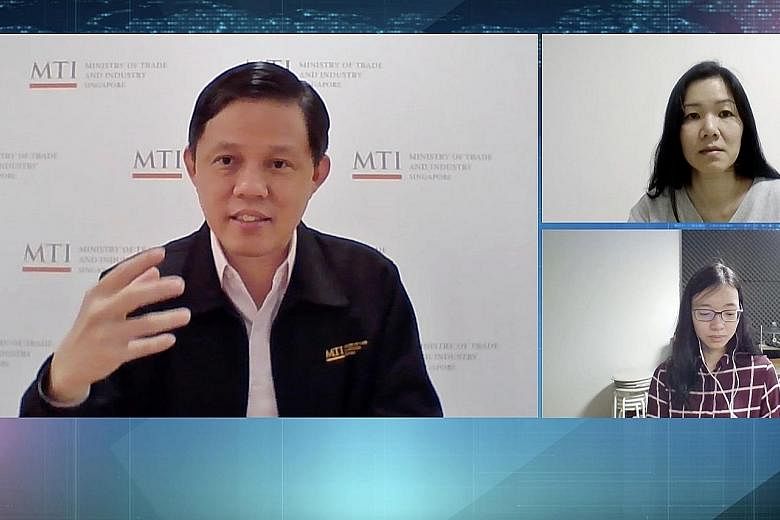Singapore will have to live with the coronavirus at least for the next one or two years. This is the new normal envisioned by Trade and Industry Minister Chan Chun Sing in an interview with The Straits Times.
Companies must get used to remaining in a permanently distanced state until a vaccine is found or rapid, affordable test kits for Covid-19, akin to pregnancy test kits, are developed.
Mr Chan said: "I don't think we have fully seen the virus and its trajectory played out yet. So, it is also not likely for us to say that we will get into a post-Covid world any time soon."
But along with the challenges, there will be opportunities as well for companies here, he added, highlighting the shifts in the economy and changes in the way people will work. Certain established industries, such as retail and food and beverage, may see some decline, but newer ones like 5G and biopharma will thrive.
Similarly, the nature of jobs may change, and workers will have to be au fait with digital technologies even if they belong to sectors that did not use them before.
He said Singapore will have to continue to respond to the bigger forces buffeting global trade.
Already, the US-China trade war and rising protectionism before Covid-19 had forced countries to introduce more diversity in their sources so that supply chains are not disrupted too easily, he said.
Now with the pandemic causing even more disruption, a new balance will have to be struck between resilience and efficiency, he added.
But he cautioned that even as Singapore strives to become more resilient, it is not practical to produce everything and not rely on foreign trade at all. "Even if you produce everything yourself, on the assumption that you can, it's not going to make you any more resilient. You just transfer the risk from, say, outside to inside the country."
Countries had also plugged into regional supply chains as they reduced reliance on China and the US, and this pace will quicken as the coronavirus forces greater adoption of digital technology, he said.
The geopolitical forces and protectionist sentiments, as they play out, will bring new opportunities, said Mr Chan.
As multinational companies reorganise their production systems and go beyond traditional sources such as China and India, for instance, they could turn to South-east Asia if the Asean countries can integrate their market well, he said.
Singapore, as a trusted hub for trade, logistics, finance, intellectual property and legal services, can work with its Asean partners to seize these opportunities, he said. "We have not succumbed to the pressures of applying trade restrictions, export restrictions even in the most difficult times."
Citing the global mask shortage episode, he pointed out: "We did not impose export controls and allowed companies based here to continue to fulfil their global supply chain responsibilities.
"These have put us in good stead and when people look at where to plant their future investments, Singapore will come to mind."
Another trend the minister highlighted in Singapore's favour is companies moving to bring their research and development (R&D) activities closer to their markets.
This allows Singapore to position itself as a base for R&D activities meant for the regional market.
Meanwhile, as China diversifies, Singapore can work with the superpower in the region - which it has started to do by building industrial parks in third countries, for instance, he added.
Singapore must also continue to invest in industries such as biopharma and autonomous vehicles that are a critical part of the global supply chain, he said. "That will... give us a seat at the table," he added.
Meanwhile, should the coronavirus flare up again, the measures put in place will hopefully not affect the entire economy, Mr Chan said.
Sketching out what a future circuit breaker may look like for businesses as Singapore prepares to emerge from 56 days of being partially locked down, he said that in the event of an outbreak in a company, the cases will be quickly identified, isolated and treated, while mitigation measures would be put in place for the specified sector the cases come from.
But for this strategy to work, the different economic sectors have to reopen in phases and develop sectorwide plans to prepare for staff returning to the workplace. The Government is working closely with trade associations, chambers of commerce and companies to design measures that are sustainable and effective, he added.
"Employers must understand that everyone has the incentive to do this well, because if they don't and there's a cluster in their companies, then they won't be able to have the business continuity that they want," he said.
"What we don't want is a start-stop kind of a system where today we start, tomorrow we stop because of an outbreak. And what we don't want is to have the need for the whole economy to go into a circuit breaker mode."












